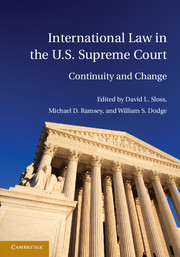Book contents
- Frontmatter
- Contents
- List of Contributors
- Table of Cases
- Acknowledgments
- Introduction
- PART I FROM THE FOUNDING TO THE CIVIL WAR
- PART II FROM THE CIVIL WAR TO THE TURN OF THE CENTURY
- 2 Treaties in the Supreme Court, 1861–1900
- 3 Customary International Law in the Supreme Court, 1861–1900
- 4 International Law as an Interpretive Tool in the Supreme Court, 1861–1900
- 5 A Social History of International Law: Historical Commentary, 1861–1900
- PART III FROM THE TURN OF THE CENTURY TO WORLD WAR II
- PART IV FROM WORLD WAR II TO THE NEW MILLENNIUM
- PART V INTERNATIONAL LAW IN THE U.S. SUPREME COURT IN THE TWENTY-FIRST CENTURY
- V.A TREATIES AFTER 2000
- V.B CUSTOMARY INTERNATIONAL LAW AFTER 2000
- V.C INTERNATIONAL LAW AND CONSTITUTIONAL INTERPRETATION AFTER 2000
- V.D INTERNATIONAL LAW AND STATUTORY INTERPRETATION AFTER 2000
- V.E INTERNATIONAL LAW AND THE WAR ON TERROR
- VI CONCLUSION
- Index
- References
4 - International Law as an Interpretive Tool in the Supreme Court, 1861–1900
Published online by Cambridge University Press: 05 July 2011
- Frontmatter
- Contents
- List of Contributors
- Table of Cases
- Acknowledgments
- Introduction
- PART I FROM THE FOUNDING TO THE CIVIL WAR
- PART II FROM THE CIVIL WAR TO THE TURN OF THE CENTURY
- 2 Treaties in the Supreme Court, 1861–1900
- 3 Customary International Law in the Supreme Court, 1861–1900
- 4 International Law as an Interpretive Tool in the Supreme Court, 1861–1900
- 5 A Social History of International Law: Historical Commentary, 1861–1900
- PART III FROM THE TURN OF THE CENTURY TO WORLD WAR II
- PART IV FROM WORLD WAR II TO THE NEW MILLENNIUM
- PART V INTERNATIONAL LAW IN THE U.S. SUPREME COURT IN THE TWENTY-FIRST CENTURY
- V.A TREATIES AFTER 2000
- V.B CUSTOMARY INTERNATIONAL LAW AFTER 2000
- V.C INTERNATIONAL LAW AND CONSTITUTIONAL INTERPRETATION AFTER 2000
- V.D INTERNATIONAL LAW AND STATUTORY INTERPRETATION AFTER 2000
- V.E INTERNATIONAL LAW AND THE WAR ON TERROR
- VI CONCLUSION
- Index
- References
Summary
This chapter describes the U.S. Supreme Court's use of international law as an interpretive tool in statutory and constitutional interpretation cases from 1861 to 1900. Part I discusses the Court's use of international law in statutory interpretation cases. Part II examines the role that international law played in the Court's constitutional decisions. Part III discusses the role of international law in the evolution of foreign, federal, and state sovereign immunity doctrines during this period. Part IV addresses overarching themes that emerge from the analysis in the first three parts.
International Law and Statutory Interpretation
Part I surveys the Supreme Court's use of international law as an aid to statutory interpretation in cases decided between 1861 and 1900. The analysis is divided into three sections. The first section addresses the Court's approach in cases implicating the application of congressional enactments outside the United States. In these cases, the Court often invoked international law to help justify the extraterritorial application of federal statutes. Surprisingly, the Court did not decide any cases during this period in which it applied international law to constrain the extraterritorial application of federal statutes, although it had some opportunities to do so.
The next two sections analyze how the Court resolved apparent conflicts between statutes and the unwritten law of nations, and between statutes and treaties, respectively. The analysis demonstrates that in statutory interpretation cases during this period the Court generally construed statutes to avoid conflicts with international law.
- Type
- Chapter
- Information
- International Law in the U.S. Supreme Court , pp. 124 - 163Publisher: Cambridge University PressPrint publication year: 2011
References
- 1
- Cited by



